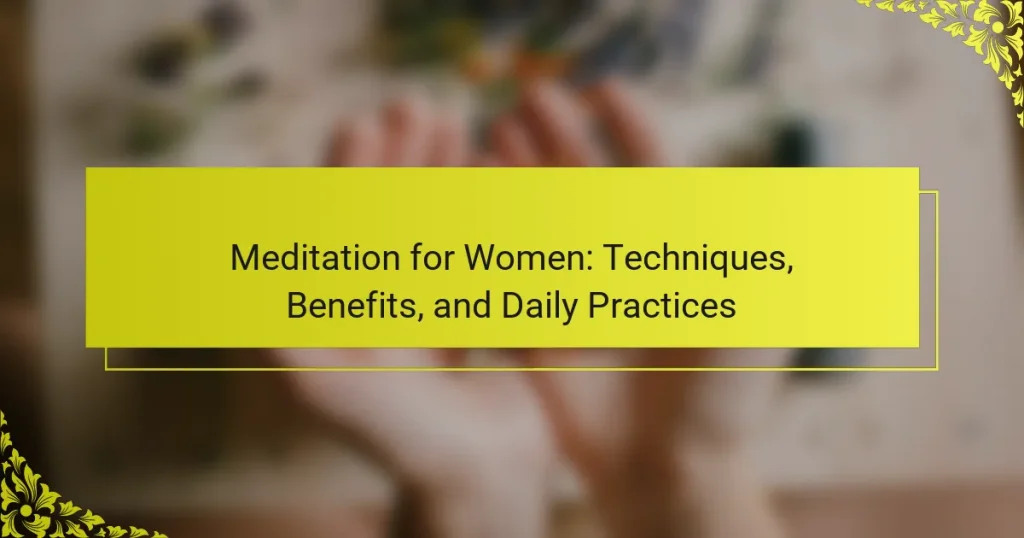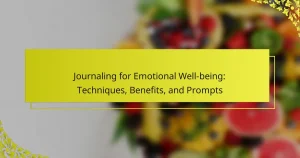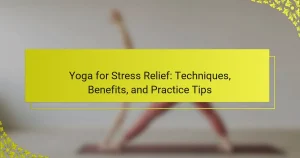Meditation can significantly enhance emotional resilience and mental clarity for women. This article explores various techniques such as mindfulness, loving-kindness, and guided visualization. It highlights the unique benefits of meditation tailored to women’s needs, including emotional healing and empowerment. Daily practices and expert insights will also be discussed to help establish a consistent meditation routine.
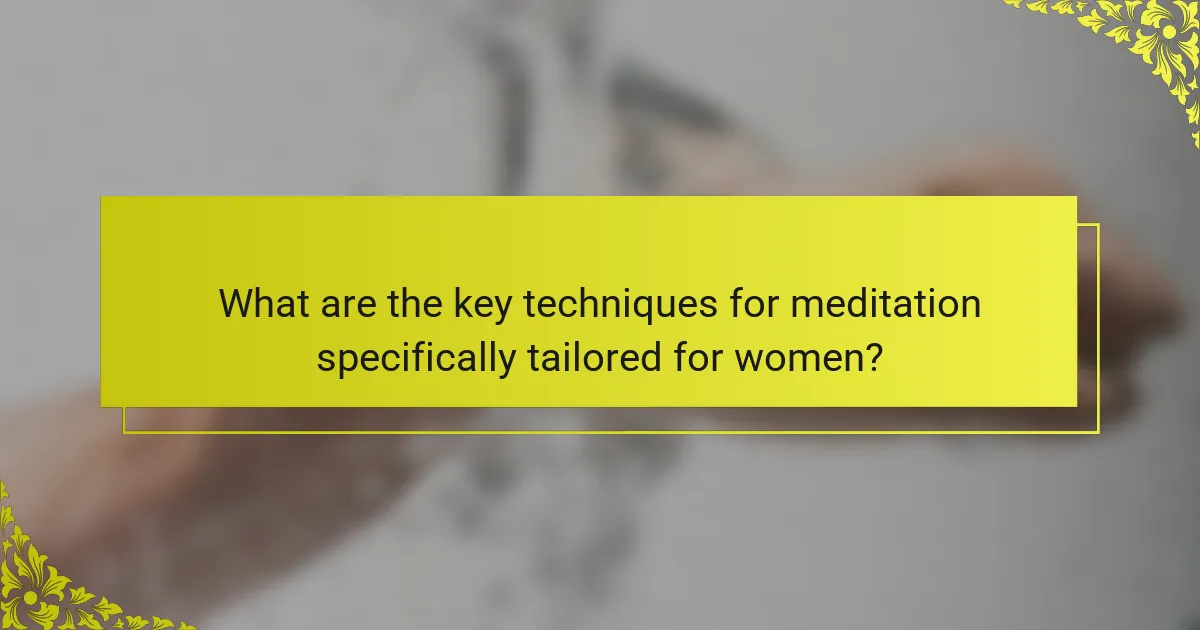
What are the key techniques for meditation specifically tailored for women?
Meditation techniques for women include mindfulness, loving-kindness, and guided visualization. These practices enhance emotional well-being, reduce stress, and foster self-acceptance. Mindfulness encourages present-moment awareness, while loving-kindness promotes compassion towards oneself and others. Guided visualization helps in achieving specific goals or relaxation. Each technique supports women’s unique emotional and mental health needs.
How can guided meditation enhance the experience for women?
Guided meditation enhances the experience for women by fostering emotional well-being and promoting self-acceptance. It offers tailored techniques that address unique stressors women face, such as societal pressures and life transitions. Studies indicate that women practicing guided meditation report increased relaxation and reduced anxiety levels. Additionally, the communal aspect of group sessions can strengthen social bonds, providing support and shared experiences. Regular practice can lead to improved mental clarity and a deeper connection to oneself, which are valuable for personal growth.
What role does visualization play in women’s meditation practices?
Visualization enhances women’s meditation practices by fostering deeper emotional connections and clarity. It allows practitioners to create mental imagery that supports relaxation and focus. For instance, visualizing serene landscapes can evoke calmness, while envisioning personal goals can motivate and inspire. This technique uniquely empowers women to navigate their meditation journeys effectively. Additionally, studies show that incorporating visualization can lead to improved stress reduction and emotional well-being, making it a valuable tool in daily practices.
How does breathwork differ in women’s meditation?
Breathwork in women’s meditation emphasizes emotional release and empowerment. Women often experience unique stressors, making breathwork techniques more tailored to their needs. For instance, practices may focus on nurturing, grounding, and connecting with feminine energy, which can enhance overall well-being. Additionally, studies show that women may respond differently to breath patterns, highlighting the importance of personalized approaches in meditation.
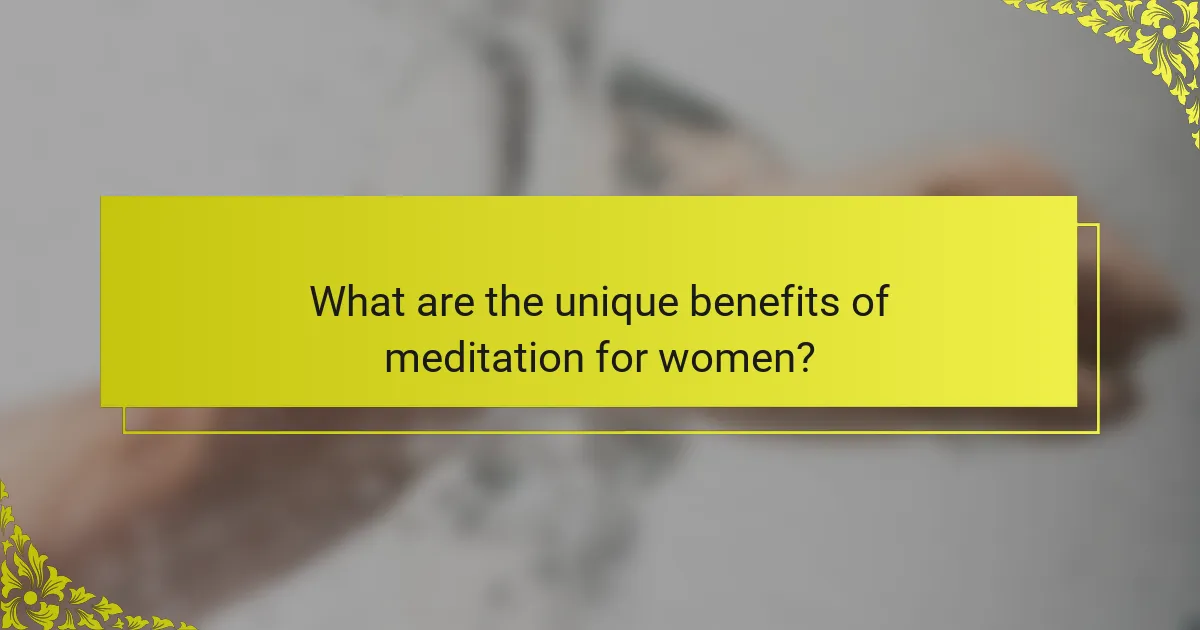
What are the unique benefits of meditation for women?
Meditation offers unique benefits for women, including enhanced emotional resilience and improved mental clarity. Research indicates that women who meditate regularly experience reduced anxiety and stress levels, promoting overall well-being. Additionally, meditation fosters self-acceptance, empowering women to cultivate a positive self-image. The practice can also improve sleep quality, which is essential for physical health. As a result, women may find meditation to be a valuable tool for balancing their emotional and mental health needs.
How does meditation support women’s mental health?
Meditation significantly enhances women’s mental health by reducing stress, anxiety, and depression. Regular practice fosters emotional resilience and promotes mindfulness, leading to improved overall well-being. Studies indicate that women who meditate experience lower cortisol levels, which are linked to stress reduction. Additionally, meditation encourages self-compassion and enhances emotional regulation, making it a powerful tool for mental health support.
What physical health benefits can women gain from meditation?
Meditation offers numerous physical health benefits for women, including reduced stress, improved sleep quality, and enhanced immune function. Regular practice can lower blood pressure and alleviate chronic pain. Furthermore, meditation promotes emotional well-being, which indirectly supports physical health. Studies show that women who meditate experience better overall health outcomes, including a 30% reduction in stress-related symptoms.
How does meditation impact women’s emotional well-being?
Meditation significantly enhances women’s emotional well-being by reducing stress and anxiety. Regular practice fosters emotional resilience, improves mood, and promotes a sense of inner peace. Studies indicate that women who meditate experience lower levels of depression and increased self-awareness. Additionally, mindfulness techniques help women manage their emotions more effectively, leading to healthier relationships and improved overall mental health.
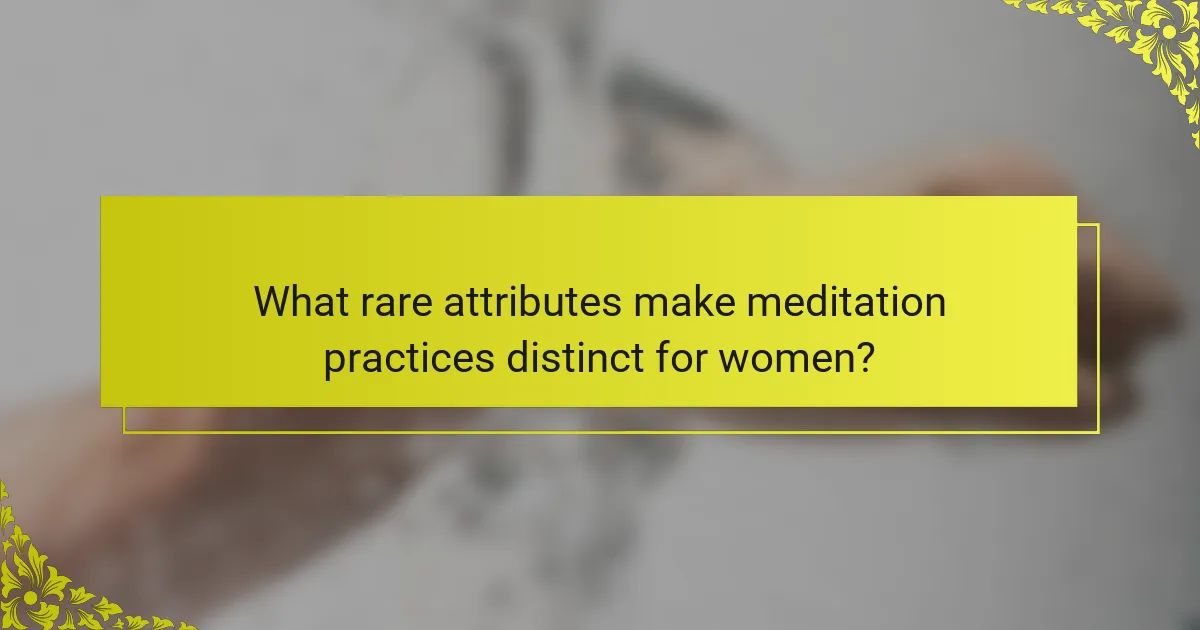
What rare attributes make meditation practices distinct for women?
Meditation practices for women often incorporate unique attributes that cater to their specific experiences and needs. These practices can emphasize emotional healing, community connection, and empowerment, setting them apart from general meditation techniques.
For instance, women may engage in meditation that focuses on the menstrual cycle, using it as a guide for timing their practices. This approach can enhance self-awareness and promote a deeper connection to their bodies. Additionally, group meditation sessions can create a supportive environment, fostering a sense of belonging and shared experience among participants.
Another rare attribute is the integration of feminine archetypes in guided meditations, which can resonate with women’s personal journeys. These archetypes often reflect qualities like nurturing, intuition, and strength, offering relatable frameworks for self-exploration.
Finally, women may also explore meditation techniques that address societal pressures and expectations, allowing for a transformative space to process these challenges and cultivate resilience.
How can meditation address specific challenges faced by women?
Meditation can effectively address specific challenges faced by women, including stress management, emotional balance, and self-empowerment. Techniques like mindfulness and guided visualization help reduce anxiety and enhance mental clarity. Studies show that regular meditation can improve overall well-being by promoting resilience against societal pressures. Additionally, it fosters a strong sense of community among women, creating supportive networks that encourage personal growth.
What unique cultural perspectives influence women’s meditation?
Cultural perspectives significantly shape women’s meditation practices. Diverse traditions offer unique techniques and philosophies that enhance meditation experiences. For instance, Eastern practices often emphasize mindfulness and connection to nature, while Western approaches may focus on stress relief and self-improvement. Additionally, community support in various cultures fosters a sense of belonging, encouraging women to engage more deeply with meditation. These perspectives enrich women’s meditation by integrating personal, social, and spiritual dimensions, making it a multifaceted practice that resonates across different backgrounds.
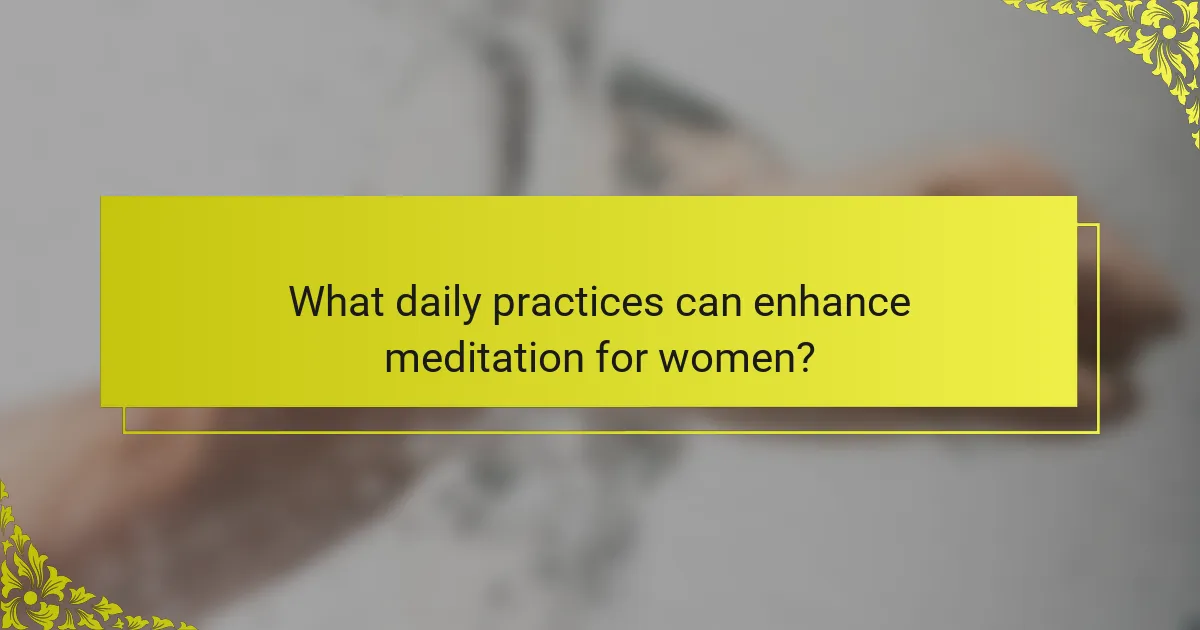
What daily practices can enhance meditation for women?
Daily practices that enhance meditation for women include setting a consistent schedule, incorporating mindful breathing, and utilizing guided meditations. Establishing a regular meditation time helps create a habit, making it easier to engage in the practice. Mindful breathing techniques, such as inhaling deeply and exhaling slowly, can improve focus and relaxation. Guided meditations provide structure and can introduce new techniques, making meditation more accessible and enjoyable. Additionally, journaling reflections after meditation can deepen self-awareness and track progress.
How can women create a conducive environment for meditation?
Women can create a conducive environment for meditation by ensuring comfort, minimizing distractions, and fostering a peaceful atmosphere. Key elements include selecting a quiet space, using soft lighting, and incorporating calming scents like lavender. Personalizing the space with meaningful objects can enhance the meditation experience. Additionally, establishing a consistent routine helps reinforce the practice, making it a cherished part of daily life.
What are effective time management tips for integrating meditation into a busy schedule?
To integrate meditation into a busy schedule, prioritize short sessions and consistency. Aim for five to ten minutes daily, using guided apps for structure. Set specific times, such as morning or evening, to build a routine. Use reminders to stay accountable and create a dedicated space for practice. Incorporate mindfulness during daily tasks, such as walking or eating, to enhance your meditation experience.
What common mistakes should women avoid in their meditation practice?
Women should avoid common mistakes in meditation that hinder progress. Key errors include setting unrealistic expectations, skipping consistency, and neglecting proper posture.
1. Setting unrealistic expectations: Expecting immediate results can lead to frustration. Meditation is a gradual process that requires patience.
2. Skipping consistency: Inconsistent practice limits benefits. Daily meditation, even for a few minutes, enhances effectiveness.
3. Neglecting proper posture: Poor posture can cause discomfort and distract from the experience. Maintaining an upright position supports focus.
4. Overthinking: Analyzing thoughts during meditation can disrupt mindfulness. Allow thoughts to come and go without judgment.
5. Comparing experiences: Each meditation journey is unique. Avoid comparing your practice to others, as this can lead to discouragement.

What expert insights can optimize meditation experiences for women?
Expert insights can enhance meditation experiences for women by focusing on tailored techniques and practices. Incorporating mindfulness practices specifically designed for women’s health can deepen emotional awareness and resilience. Research indicates that women may benefit from guided meditations that address stress and anxiety, as these are common concerns. Additionally, integrating breathwork and visualization techniques can promote relaxation and self-empowerment. Establishing a consistent daily practice, even for short durations, can lead to significant improvements in mental clarity and emotional balance.
How can women leverage community support in their meditation journey?
Women can enhance their meditation journey by actively engaging with community support. Joining groups allows for shared experiences, motivation, and accountability. This social aspect fosters a unique environment where women can explore different meditation techniques and practices together.
Participating in workshops and local classes can provide access to expert guidance and diverse perspectives. Additionally, online forums and social media groups create rare opportunities for connection, enabling women to discuss challenges and celebrate progress. These interactions can significantly enrich the meditation experience, promoting emotional well-being and resilience.
Ultimately, leveraging community support empowers women to deepen their practice and remain committed to their meditation journey.
What are the best resources for women to deepen their meditation practice?
To deepen their meditation practice, women can explore various resources tailored to their needs. Recommended options include guided meditation apps, online courses, books focused on women’s experiences, and local meditation groups or workshops.
1. Guided Meditation Apps: Apps like Insight Timer and Headspace offer specific content for women, including themes of empowerment and self-care.
2. Online Courses: Platforms such as Udemy and Coursera provide courses led by experienced female instructors, focusing on techniques and mindfulness.
3. Books: Titles like “Women Who Run with the Wolves” by Clarissa Pinkola Estés offer insights into the feminine experience and meditation.
4. Local Groups: Joining community meditation sessions can foster connection and support among women, enhancing the practice through shared experiences.
These resources can provide unique insights and support, enriching the meditation journey for women.
